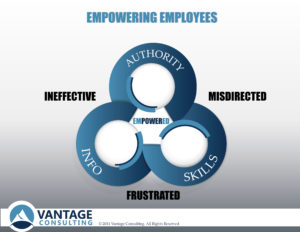The Leader’s Guide to Peerless Delegation

 One of the most common leadership frustrations is being too busy. Feeling overwhelmed. Not being able to get it all done.
One of the most common leadership frustrations is being too busy. Feeling overwhelmed. Not being able to get it all done.
Possibly the second most common frustration is someone you supervise who doesn’t delegate well to others. Someone who doesn’t leverage their staff and resources well.
Leaders frequently tell me about the current crisis preventing needed change. The most recent fire that excuses them from addressing a difficult issue. “It’s impossible.” “I don’t have time.”
I used to work in international disaster relief. These were actual, literal disasters. War that destroyed 80% of the homes in Kosovo. A tsunami in Indonesia that leveled cities for miles along the coast. Famine, disease, and warfare in Sudan that had killed millions of people. Millions.
In the middle of real disasters, it turns out you can still meet, prioritize, organize, be intentional and delegate well. In fact, you won’t accomplish anything of value if you can’t.
So, while I sympathize with the feelings of overwhelm, I don’t sympathize with the choice to stay in that place. Particularly if your disaster isn’t really a disaster.
The Unbelievable Power of Plain Jane Delegation
Delegating. It’s the humble, seemingly mundane skill of highly effective leaders. Delegation is the ability to give away responsibility, authority and decision making while still coordinating efforts towards success.
Individual skills in delegation fall on a scale. There are gradients of ability.
When leaders delegate well, it can sometimes be difficult even to see what they are doing. This can often lead new leaders to mistakenly believe that very little effort has been put into the process.
When leaders delegate poorly, it is usually immediately obvious. This can often lead new leaders to believe that delegation is enormously complex and possibly not worth the effort.
Leaders who struggle to delegate will hit a natural ceiling. Their ability to create growth will stop.
Here’s a fundamental trust: Leaders who grow things – organizations or lots of other people – are leaders who know how to delegate. The better someone is at delegating, the more growth is possible.
How to Delegate Effectively
1) Create a Clear Picture of Vision. Or goals. Or desired outcomes. Call it what you want. The better you can describe what you are trying to accomplish, the easier it is for others to see it and move towards it.
This is part of why an architect builds or draws models of buildings and blueprints. Both take some time to create. But the process of creating these first clarifies what is desired. Second, it takes the vision out of the mind of the architect and makes it accessible to others. For both inspiration and guidance.
Why is this important?
Any architect who relies solely on a mental image, or withholds her private model and blueprint – forces everyone to rely on her to get anything done. Perhaps, for small projects, this is manageable. But for large projects, it becomes overwhelming and impossible. The competent and hard-working people surrounding her won’t know what to do next. They can’t self-manage or self-organize.
Getting the picture outside of herself, with just enough detail, allows others to figure out how to build it.
2) Stage Your Goals. By “stage” I’m referring to segments of time. When managing front-line staff, this might mean a shift. Or this week. When working with senior leadership, it may mean a fiscal year. Or a quarter. They should be logical chunks of time – based off of what makes sense in your situation.
For each of these stages, identify what should be accomplished by the end of each stage. By this, I don’t mean all of the tasks. I mean the primary goal that will build into the vision.
Going back to the building analogy: Stage 1: All of the earthwork is done. Stage 2: The foundations have been laid. Stage 3: The walls go up. And so on. Each of these goals is filled with a multitude of tasks.
Learning to manage or lead to stages is very helpful. Many of the best “doers” on the team often will struggle to see the larger vision. Even when they do, they’ll tend to forget it because of the demands of the moment. Having a near range vision for them helps keep them focused and directed. It’s actually less stressful for them.
It also provides natural assessment points. Natural places to stop and ask, “How are we doing?”
The better you become at delegating, and the more mature your team is, the longer the stages can be.
Why is this important?
It reduces your management load. This breaks the vision down into manageable pieces. Some people have the competency to be given whole pieces. They’ll start to run towards accomplishing it. Give them just enough guidance to know what a good decision looks like and let them go.
3) Identify Key Tasks (and their Timelines) Per Stage. It’s usually best to work with your team on this. Let them help you decide what needs to be done to accomplish the primary goals for each stage.
Identify everything that needs to be done to accomplish the goal for each stage. This can easily just be a big list. It doesn’t have to be complicated.
Why is this important?
This process serves three purposes:
- It makes sure that everything that needs to be done is considered. That makes it available to be assigned to someone.
- It gives you a more accurate sense of how much work there is. Perhaps you can take on more. Perhaps you need more time or more resources. It is difficult to know what is needed until you know what needs to be done.
- It additionally decreases stress. Much of the crisis and business that people feel is less about all the work people need to do and more about all the work they are thinking about. So, decreasing your staff’s mental load helps them focus and become more efficient.
4) Assign tasks. Now you’re at the obvious point of delegating! Assign tasks to people. Make just one person responsible for each task. Perhaps more than one will work on it – but assign responsibility to one.
Keep track of what you’ve assigned to people. I invariably find that there are some people who will try to take on too much and others who are happy to let them. Track the load you’ve delegated out and adjust appropriately.
Why is this important?
We’ve all sat in on a meeting where everyone either is told what needs to be done or collaboratively figures it out together. Then everyone leaves and no one does anything.
Assigning one person to be responsible simplifies lines of communication. It helps keep responsibility. It helps everyone know what everyone else is doing – so they know what they can expect from each other.
5) Accountability. Create a schedule for check-ins. Keep the check-ins short. Identify what is working well, what challenges have been encountered and what isn’t working. Coach as needed.
Many leaders try to skip this step. It’s actually the most common response – to try to delay or avoid actually finding out if progress has been made. It is critically important, though. It provides a great place to recognize those who are doing well.
Why is this important?
It’s an opportunity to check in and help those who need it. It is a great time to course correct if there are unanticipated issues or opportunities that have emerged.
Ingredients of Delegation
At any level you delegate, it is imperative to match the appropriate amount of these three qualities to the people and these responsibilities: Decision Making Authority, Sufficient Information & Appropriate Skills.
If you delegate:
- Authority + Information – Skills you get ineffective efforts.
- Information + Skills – Authority you get frustrated efforts.
- Skills + Authority – Information you get misdirected efforts.
Make sure you have all three.
Take good care,
Christian Muntean
Would you like to quickly build your leadership impact and influence? Would you like your teams to move faster towards accomplishing goals and working through obstacles? Would you like to experience a year of growth?
I’m offering a fully-guaranteed leadership coaching opportunity. This opportunity closes June 16th and won’t be available again for some time. I’m only making a few spots available. Contact me now to see if this opportunity is right for you.
Email me at Christian@vantageconsulting.org or call me at 907 522-7200.
Article Categories
Popular articles

Download my free 10-page eBook:
How To Accomplish More Without Doing More:
Eight Proven Strategies To Change Your Life
Discover how to save eight hours during your workweek-even if you're too busy to even think about it. The resource every maxed out executive needs.
